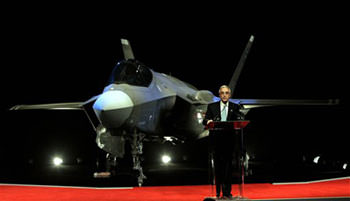Indefensible Spending
What should be the most important issue in this election is one that is rarely, if ever, addressed: Why is U.S. military spending at the highest point, in inflation-adjusted dollars, than at any time since the end of World War II?
This Op-Ed was originally published in The Los Angeles Times.
What should be the most important issue in this election is one that is rarely, if ever, addressed: Why is U.S. military spending at the highest point, in inflation-adjusted dollars, than at any time since the end of World War II? Why, without a sophisticated military opponent in sight, is the United States spending trillions of dollars on the development of high-tech weapons systems that lost their purpose with the collapse of the Soviet Union two decades ago?
You wouldn’t know it from the most-exhausting-ever presidential primary campaigns, but the 2009 defense budget commits the United States to spending more (again, in real dollars) to defeat a ragtag band of terrorists than it spent at the height of the Cold War fighting the Soviet superpower and what we alleged were its surrogates in the Korean and Vietnam wars.
The Pentagon’s budget for fiscal year 2008 set a post-World War II record at $625 billion, and that does not include more than $100 billion in other federal budget expenditures for homeland security, nuclear weapons and so-called black budget — or covert — operations.
And what are we spending all this money on? We are talking high-tech war toys designed to fight a Cold War enemy that no longer exists, including the F-35 Joint Strike Fighter program, with its estimated total price tag of $300 billion, and Virginia-class submarines at $2.5 billion each. Who cares that the terrorists lack submarines for the Navy to battle deep in the ocean, for which the Virginia-class submarine was designed?
Then there are the F-22 Raptor jet fighters that no longer fill a credible military purpose but will take $65 billion out of taxpayers’ pockets. The Raptor includes stealth technology and elaborate electronics designed to counter threatened leaps in Soviet war-fighting capability. In 2005, Lawrence J. Korb, an assistant secretary of Defense in the Reagan administration, wrote that the Raptor “is the most unnecessary weapon system being built by the Pentagon.”
Since President Bush’s first year in office, according to the Government Accountability Office, the Defense Department has doubled its future planned investment in those ultra-pricey weapons from $790 billion to $1.6 trillion.
When pressed on why the massive weapons arsenal we already possess, which was credited with intimidating the Soviet Union into surrender, isn’t sufficient to keep the peace in a suddenly unipolar world, defense hawks sometimes cite what they claim is an emerging threat from China. “The Chinese are designing new classes of submarines with increased capabilities,” said Sen. Joe Lieberman (I-Conn.). “If we do not move to produce two submarines a year as soon as possible, we are in serious danger of falling behind.”
That is nonsense. China is not even a serious regional power, as the Pentagon’s 2007 report to Congress makes clear: “The intelligence community estimates China will take until the end of this decade or later to produce a modern force capable of defeating a moderate-size adversary.” The report noted that “China’s military is focused on assuring the capability to prevent Taiwan independence,” but this last week the military threat to Taiwan gave way to a historic peace opening, with the first visit by the head of Taiwan’s ruling party to the mainland since the 1949 revolution.
Oh, and here’s another thing. Those Virginia-class submarines that Lieberman says are so important to our national security and for which he lobbied so hard? General Dynamics’ Electric Boat Co. has received multibillion-dollar contracts to build them. The company is based in Connecticut, suggesting that the real goal here was to find an enemy — any enemy — that would justify spending U.S. tax dollars on weapons produced in his home state.
Since the 9/11 attacks, the United States has been on a madcap spending spree on wars and weapons having little, if anything, to do with combating terrorism, nothing to do with the imaginary threat from China and everything to do with sustaining an enormously bloated defense industry threatened with extinction because of the demise of the communist enemy. The fact is, the end of the Cold War was a welcome development for everyone except for those in the military-industrial complex whose profits and jobs, as President Eisenhower famously warned, are rooted in every congressional district.
As President George H.W. Bush noted in his 1992 State of the Union address, “communism died this year,” and, he promised, “we can stop making the sacrifices we had to make when we had an avowed enemy that was a superpower. Now we can look homeward even more and set right what needs to be set right.” Toward that end, he ordered his secretary of Defense, Dick Cheney, to initiate a 30% cut in defense spending. Gloom and doom in the military-industrial complex was palpable.
But then came what defense industry lobbyists and their many allies on both sides of the aisle in Congress came to treat as the gift of 9/11, offering dramatic imagery of a new global enemy. Fortunately for those who profit from a permanent war economy, few in government or the media were inclined to challenge the enemy bait-and-switch game that unfolded. The defense industry and the Pentagon bureaucracy that services it were all too happy to accept whatever war they could embrace, even if the new “global war on terrorism” that President George W. Bush launched was to be fought against an enemy armed primarily with weapons that could be purchased for a few dollars at Home Depot.
The Soviets had developed the most modern arsenals, and the 9/11 hijackers were armed with box cutters, so how could we justify spending more to defeat al-Qaida than we ever did to combat the communist enemy? That is the third-rail issue that politicians and the media dread touching because of the national security hysteria generated after the 9/11 attacks. Yet no presidential candidate can be serious about cutting the federal debt, improving education, holding down taxes or paying for any of the other things that the candidates of both parties promise without cutting military spending.
Without slashing the inflated military budget, the next president, who will inherit at least a $400-billion current-accounts deficit along with debt service on seven years of profligate military spending, will not be able to finance any of the domestic reforms that both the surviving Republican candidate and his two Democratic opponents advocate.
Maybe one can make a case that it is appropriate that more than half of the discretionary funds in the 2009 budget go to defense, and all the other federal programs for science, education, infrastructure, global warming and nonmilitary international programs compete for the rest. But isn’t it bizarre that the biggest peacetime military budget in U.S. history — 35% higher than when Bush came into office and larger than the military budgets of all other nations combined — is not even discussed in the current presidential contest?
That is because politicians from both parties are complicit in the waste of taxpayer dollars on weapons systems that deliver jobs to their home districts and profits to their defense industry campaign contributors. It is a disease of our political system predicted by two of our great wartime generals-turned-president. First was George Washington, warning in his farewell address that once a nation embarks on the path of imperial adventure, the irrationality of false patriotic appeals would trump reason. What better time to recall Washington’s historic caution to the nation “to guard against the impostures of pretended patriotism.”
In Eisenhower’s farewell address, he warned that “in the councils of government, we must guard against the acquisition of unwarranted influence, whether sought or unsought, by the military-industrial complex. The potential for the disastrous rise of misplaced power exists and will persist.”
There is no better evidence of the prescience of Washington and Eisenhower than the fact that the most obscenely bloated military budget in U.S. history is not an issue in the current presidential campaign. Sadly, defense spending has become enshrined in our political system as a totem to be worshiped rather than a policy program to be critically examined.
Robert Scheer is the author, most recently, of “The Pornography of Power: How Defense Hawks Hijacked 9/11 and Weakened America,” to be published this week by Twelve Books.
Your support matters…Independent journalism is under threat and overshadowed by heavily funded mainstream media.
You can help level the playing field. Become a member.
Your tax-deductible contribution keeps us digging beneath the headlines to give you thought-provoking, investigative reporting and analysis that unearths what's really happening- without compromise.
Give today to support our courageous, independent journalists.






You need to be a supporter to comment.
There are currently no responses to this article.
Be the first to respond.